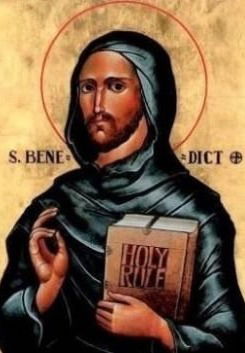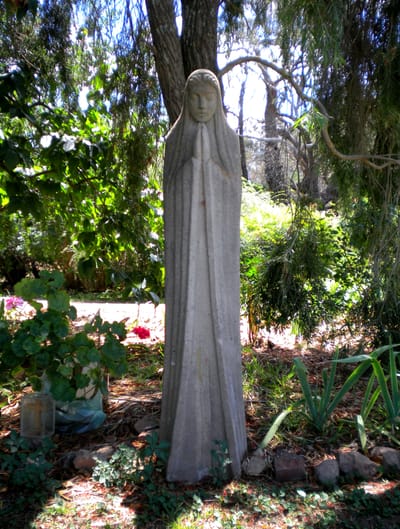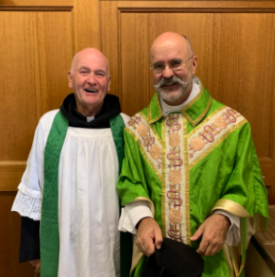Oblation



"Receive me, Lord, as you have promised, and I shall live;
do not disappoint me in my hope." (from a Rite of Oblation, Oblates of Christ the King)
Oblation is, first and foremost, an offering of one's very self - one's being - to God, from which doing flows. A Benedictine Oblate takes as their guide The Rule of St. Benedict, and some helpful modern-day commentaries, in the practice of consecrating each day - its work, leisure, inspirations, commitments, joys and sorrows to God, outside of whom none of these things, nor we, have being. Inner transformation has primacy, in the context of the work and circumstances at hand - whether these be overtly spiritual or seemingly ordinary - and by this the 'outer' is transformed, its sacredness realised.
St. Paul reminds us that good works on our part - whatever they may be - flow from the doing of God; first and foremost from God's good work of creating us in Christ. God "made us alive together with Christ ... and raised us up with him, and seated us with him in the heavenly places in Christ Jesus." It is from the place of this being-in-Christ that we walk in the good works God has prepared for us. "For we are what he has made us, created in Christ Jesus for good works, which God prepared beforehand to be our way of life."
(Letter to the Ephesians 2: 4-10)
To help us fine-tune our ability to "listen with the ear of the heart" to God's promptings, to respond wholeheartedly to, and take delight in God's being and doing in us, an Oblate's day follows, as much as is practicable, the monastic rhythm of prayer, lectio divina (literally, divine reading), work and leisure as set out by St Benedict in the 6th century. On the Gallery page, each photo caption is drawn from St Benedict's Rule, which is steeped in holy Scripture.
In the slow, rhythmic immersion in Scripture, that is lectio divina, "We listen to God speaking to us. Sometimes we hear and say 'Ah!' Sometimes we wait."
The cultivation of silence also deepens receptivity to God:
"Daily tasks done in silence heighten the awareness of the moment and its sacredness. The gift of life given to me - the ability to do the task and experience joy and praise in it - is such a gift that only our Lord can give. I know that Christ is found in all things at all times, and in silence and listening for Him, he will be found."
"External silence helps me on the journey to internal silence and peace."
(Oblates' reflections)
Mission
At an Oblates' Gathering held some years ago at the Community of Christ the King, the question was posed: "As listeners, do we have a mission in the world?" As one Oblate responded,
"We have a mission in the world by being open to God's Word. We are open to all we meet, including those in their struggle to live in this troubled time. Being open to God's love, we are open to those we meet in our daily life. Not preaching, just being, and praying that people will see a little of our Lord in our life."
In the words of Mother Rita Mary, the late Superior of the Community of Christ the King,
"As we sit in the pews on Sunday, do we realise that we have come to Feast on the Heavenly Banquet in the Eucharist so that we may go forth to bring the life of Christ into the lives of all we meet? ... Through the teaching Jesus has left us, He has given us means to be His ambassadors. For example, His words in S. John's Gospel take us deep into the heart of God: 'As the Father has loved me, so I have loved you. Abide in my love.' There are different translations; 'Dwell in my love', 'Make your home in me'. Truly, as we do make our home in Him, we are enabled to let others enter too." (Advent letter, in preparation for the Feast of Christ the King, 2012)
Becoming an Oblate of Christ the King
Oblation is open to women and men, clerical or lay, who are committed members of the Anglican Church, or a denomination approved by the Community, who believe themselves called to live their lives in the world, in the Spirit of the Rule of St Benedict.
Having spent some time getting to know the Community, an Aspirant is accepted for enrolment as a Novice Oblate by the Chaplain, in conjunction with their parish priest or spiritual advisor. The Novitiate is usually not less than 12 months.
Final oblation is a life commitment, with the opportunity, if desired, to re-affirm the commitment each year. Where possible, Final oblation shall be in the presence of the Chaplain of the Chapter, or with the Oblate's own parish priest.
All Oblates should endeavour to spend some time in retreat, and if possible attend the AGM each year (distance permitting). They should endeavour to read the relevant chapter of the Rule of St Benedict each day, and to pray one Office daily.
(From the draft Constitution of the Oblates of Christ the King)